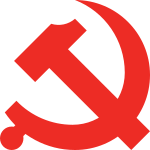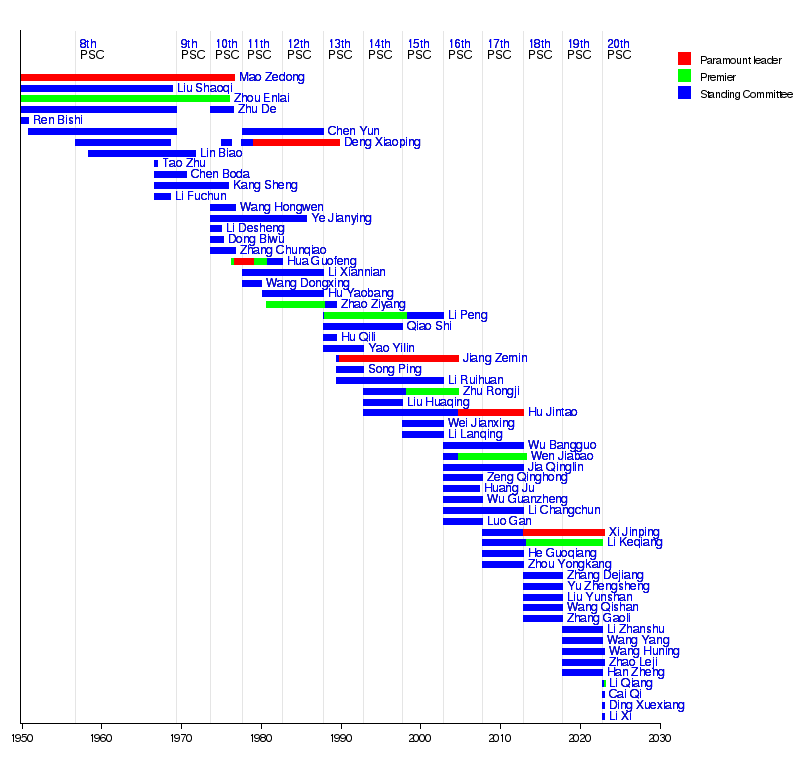Politburo Standing Committee of the Chinese Communist Party facts for kids
 |
|
| Information | |
|---|---|
| General Secretary | Xi Jinping |
| Members |
|
| Elected by | Central Committee of the Chinese Communist Party |
| Responsible to | Politburo of the Chinese Communist Party |
| Seats | 7 |
| Meeting place | |
| Qinzheng Hall, Zhongnanhai Beijing, China |
|
| Standing Committee of the Central Politburo of the Communist Party of China | |||||||
|---|---|---|---|---|---|---|---|
| Simplified Chinese | 中国共产党中央政治局常务委员会 | ||||||
| Traditional Chinese | 中國共產黨中央政治局常務委員會 | ||||||
| Literal meaning | China Communist Party Central Politburo Standing Committee | ||||||
|
|||||||
| Abbreviation(s) | |||||||
| Simplified Chinese | 中央政治局常委会 | ||||||
| Traditional Chinese | 中央政治局常委會 | ||||||
| Literal meaning | Central Politburo Standing-Committee | ||||||
|
|||||||
The Politburo Standing Committee (PSC) is a small group of top leaders in the Chinese Communist Party (CCP). It's like the main decision-making team for China. This group usually has between five and eleven members. Right now, it has seven members.
The PSC's job is to talk about important policies and make big decisions. They do this when the larger group, called the Politburo, isn't meeting. The leader of the CCP, called the General Secretary, must always be a member of this committee.
The party's rules say that the larger Central Committee chooses the Politburo Standing Committee. But in reality, the members are chosen through discussions among current and past top leaders. The PSC is very powerful because China has only one main political party. This means the decisions made by the PSC often become the country's laws. People in China and around the world watch closely to see who is in this important group.
Contents
What the Politburo Standing Committee Does
The Politburo Standing Committee is like the daily management team for the Politburo. The Politburo is a bigger group that makes policies. It reports to the even larger Central Committee, which meets about once a year.
In English, people usually call this group the "Politburo Standing Committee" or just "PSC." Chinese official news often uses a longer name, "The Standing Committee of the Political Bureau of the CCP Central Committee." Its members are called "Members of Standing Committee of the Political Bureau of the CCP Central Committee."
How Members Are Chosen
Choosing members for the Politburo Standing Committee is a very important process. It usually involves many discussions among current and retired top leaders of the party. People who want to join the PSC often need support from powerful leaders.
These leaders hold several rounds of talks and informal votes. These votes help them see who has the most support. The process of choosing new members starts in the summer before the main Party Congress meeting in the fall. The final list of candidates is usually ready a few weeks before the Congress.
Being chosen for the Standing Committee often depends on how loyal a person is to powerful leaders. It also helps to have experience leading a province or a major city. Most PSC members since the late 1990s have had this kind of experience.
Age is also important. Since 1989, all new members have been at least 50 years old. Also, since 2002, members who are 68 or older at the time of a Party Congress usually retire. This is sometimes called the "seven up, eight down" rule. It means if you are 67 or younger, you can stay or join, but if you are 68 or older, you must leave.
History of the Politburo Standing Committee
Early Years
The first Standing Committee was created in July 1928. In the early days, it was the highest group that handled the daily work of the Party's Central Committee. It was made up of the most important leaders from the larger Politburo. The CCP formed this small Standing Committee because the Politburo was considered too big to make decisions quickly.
After Economic Changes
After 1978, a leader named Deng Xiaoping wanted to make the party stronger. He helped bring back the Politburo Standing Committee as the main decision-making group. Decisions were supposed to be made by everyone agreeing, or by a majority vote. Once a decision was made, everyone in the group would support it.
The way the Standing Committee works has been quite stable since 1989. For example, in 1992, seven people were named to the Standing Committee. This group stayed the same until 1997. This showed that the PSC was becoming a group with set terms, meaning members would serve for a certain period.
In 2002, the Standing Committee grew from seven to nine members. Some people thought this was to add more members loyal to the outgoing leader, Jiang Zemin. During Hu Jintao's time as General Secretary (2002–2012), the PSC worked like a "team leadership." This meant they made decisions together as a group.
In 2012, the number of PSC members was reduced back to seven.
Current members (in order)
Historical membership and rankings
Here is a list of the historical members of the Standing Committee since 1949. They are listed by their official rank. The person ranked first has always been the Chairman or General Secretary of the CCP. The rankings of other leaders have changed over time.
- 5th PSC
- 6th PSC
- 7th Secretariat
- 8th PSC (elected September 1956): Mao Zedong, Liu Shaoqi, Zhou Enlai, Zhu De, Chen Yun, Lin Biao (X), Deng Xiaoping
- 8th PSC (Cultural Revolution re-shuffle, elected August 1966): Mao, Lin Biao (X), Zhou Enlai, Tao Zhu, Chen Boda (X), Deng Xiaoping, Kang Sheng (X), Liu Shaoqi (R), Zhu De, Li Fuchun, Chen Yun
- 9th PSC (elected April 1969): Mao, Lin Biao (D, X), Zhou Enlai, Chen Boda (X), Kang Sheng (X)
- 10th PSC (elected August 1973): Mao (D), Hua Guofeng (elevated April 1976), Zhou Enlai (D), Wang Hongwen (X), Kang Sheng (D, X), Ye Jianying, Li Desheng, Zhu De (D), Zhang Chunqiao (X), Dong Biwu (D), Deng Xiaoping (elected January 1975)
- 11th PSC (elected August 1977): Hua Guofeng, Ye Jianying, Deng Xiaoping, Li Xiannian, Wang Dongxing (resigned February 1980), Chen Yun, Hu Yaobang, Zhao Ziyang (elected February 1980)
- 12th PSC (elected September 1982): Hu Yaobang (removed January 1987), Ye Jianying (resigned September 1985), Deng Xiaoping, Zhao Ziyang, Li Xiannian, Chen Yun
- 13th PSC (elected November 1987): Zhao Ziyang, Li Peng, Qiao Shi, Hu Qili, Yao Yilin
- 13th PSC (Post-Tiananmen re-shuffle, elected June 1989): Jiang Zemin, Li Peng, Qiao Shi, Yao Yilin, Song Ping, Li Ruihuan
- 14th PSC (elected October 1992): Jiang Zemin, Li Peng, Qiao Shi, Li Ruihuan, Zhu Rongji, Liu Huaqing, Hu Jintao
- 15th PSC (elected September 1997): Jiang Zemin, Li Peng, Zhu Rongji, Li Ruihuan, Hu Jintao, Wei Jianxing, Li Lanqing
- 16th PSC (elected November 2002): Hu Jintao, Wu Bangguo, Wen Jiabao, Jia Qinglin, Zeng Qinghong, Huang Ju (D), Wu Guanzheng, Li Changchun, Luo Gan
- 17th PSC (elected October 2007): Hu Jintao, Wu Bangguo, Wen Jiabao, Jia Qinglin, Li Changchun, Xi Jinping, Li Keqiang, He Guoqiang, Zhou Yongkang (X)
- 18th PSC (elected November 2012): Xi Jinping, Li Keqiang, Zhang Dejiang, Yu Zhengsheng, Liu Yunshan, Wang Qishan, Zhang Gaoli
- 19th PSC (elected October 2017): Xi Jinping, Li Keqiang, Li Zhanshu, Wang Yang, Wang Huning, Zhao Leji, Han Zheng
- 20th PSC (elected October 2022): Xi Jinping, Li Qiang, Zhao Leji, Wang Huning, Cai Qi, Ding Xuexiang, Li Xi
Notes:
- (D): Died in office.
- (X): Expelled from party (including posthumously)
- (R): Expelled from the party, then rehabilitated

See also
 In Spanish: Comité Permanente del Buró Político del Comité Central del Partido Comunista de China para niños
In Spanish: Comité Permanente del Buró Político del Comité Central del Partido Comunista de China para niños
- Longest-serving members of the Politburo Standing Committee of the Chinese Communist Party
- Politburo of the Chinese Communist Party
- Political position ranking of the People's Republic of China
- Politics of the People's Republic of China
 | Jewel Prestage |
 | Ella Baker |
 | Fannie Lou Hamer |

